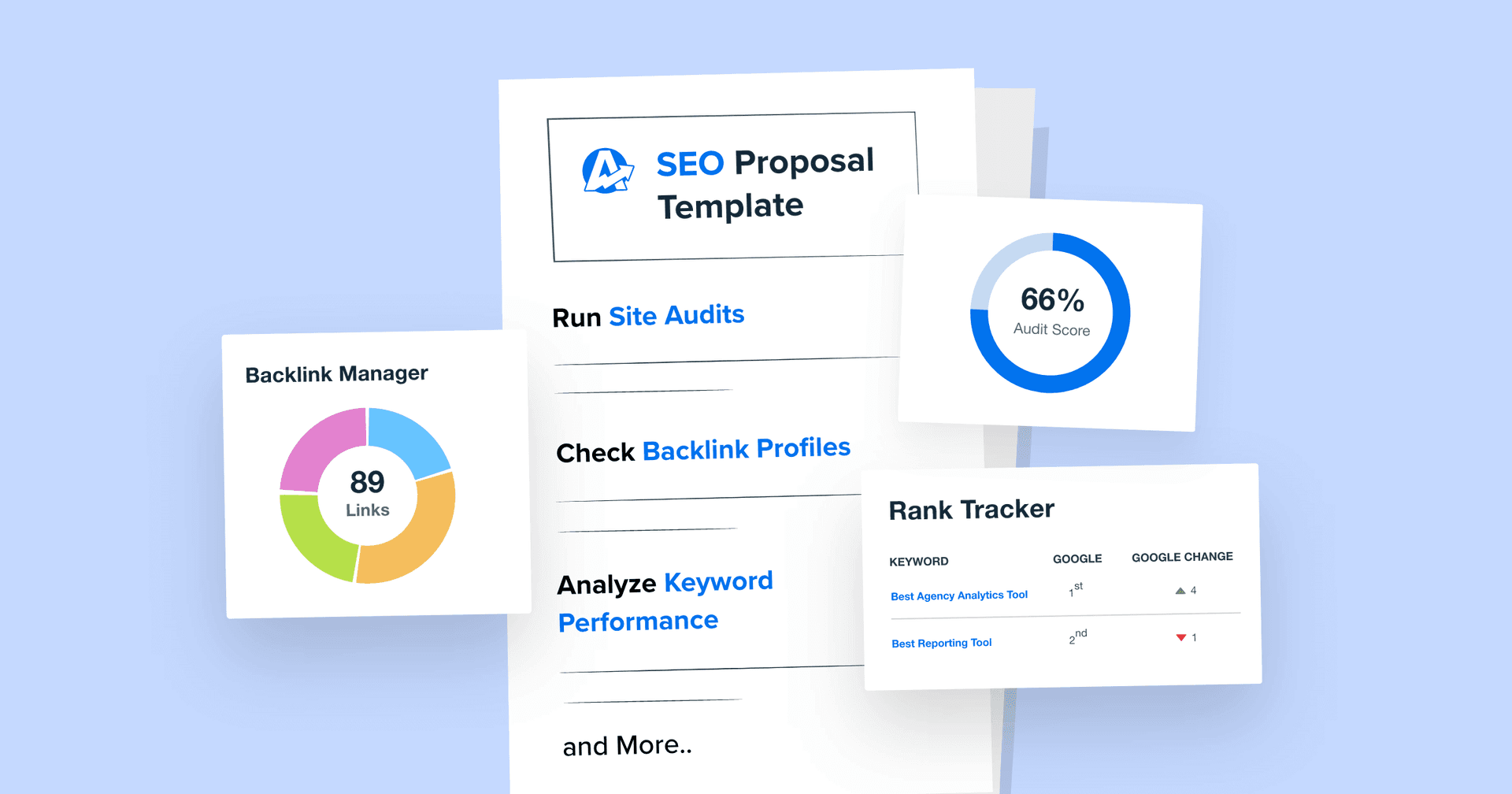Table of Contents
QUICK SUMMARY:
By leveraging CRM best practices, agencies streamline the sales process and convert more leads into loyal clients. Your CRM process needs to be organized, automated, and repeatable as your agency scales, to ensure that your team spends billable time where it matters most. In this article, we share the top CRM best practices, along with how to implement them at your agency.
In theory, every marketing agency understands the importance of nurturing strong relationships, but putting this concept into practice often becomes overwhelming as your lead and client numbers grow.
Without an effective CRM software system, scaling an agency is challenging and often results in lost opportunities.
For example, let’s say you’re a marketing agency tailored to the healthcare industry. Originally, you start with three clients, and figure you can manage the customer journey through an Excel spreadsheet, which will track contact information, lead interactions, login details, and project timelines.
As you begin to scale, manually keeping up with new customers and managing growing expectations becomes a full-time job. Eventually, data gets lost, timelines are forgotten, and client retention suffers.
This is why robust CRM solutions are key when scaling a marketing agency. An effective system should seamlessly manage client information, allowing you to track multiple accounts at different stages of the customer lifecycle without breaking a sweat.
Today, we’ll explore CRM best practices for marketing agencies, and share our tips for implementing them.
Understanding Marketing CRM
A marketing CRM solution is a system that allows agencies to nurture relationships by storing and managing key data, including client contact information, login details for client systems, project timelines, lead lists, project documents, and client retention rates.
CRM systems are especially effective at supporting marketing agencies in managing multiple clients through one platform. Think of these solutions as a central repository for client information that your team quickly accesses whenever needed.
If you’re chasing a lead, for example, your CRM would tell you how best to reach the lead, who the main contact is, how many times you’ve reached out, and how each interaction went.
Not only does a CRM system support client relationship management and decision-making, they enhance productivity, streamline communication, and increase customer satisfaction.
Why Marketing Agencies Need CRM Processes
CRM processes play a fundamental role in managing strong client relationships and increasing long-term growth. 45% of companies say their CRM software boosted sales revenue, while 91% of companies with over 11 employees admitted to using a CRM to organize a variety of business goals.
Benefits of a CRM system include:
Supporting Relationship-Building
A CRM system acts as a good client relationship manager. They allow marketing agencies to access key information vital for improving client interactions. Having easy access to contact details ensures you’ll always reach out to the right contact, simplifying how your agency will manage customer relationships. Deadline tracking features reduce the risk of missing important timelines, and data analytics capabilities let your team keep up with the latest campaign metrics for a variety of clients.
CRM systems also strengthen internal relationships within marketing agencies. Teams can better communicate with each other, easily share key metrics, and avoid creating siloed departments lacking a transparent flow of information.
We nurture client relationships through enhanced communication, regular check-ins, and proactive account management. By deeply understanding their objectives and addressing concerns, we provide personalized solutions that exceed expectations.
Joseph LeBlanc, Marketing Specialist, Studio Eighty-Eight
Increasing Long-Term Client Retention
According to the AgencyAnalytics Marketing Agency Benchmarks Survey, most marketing agencies retain clients for more than two years.
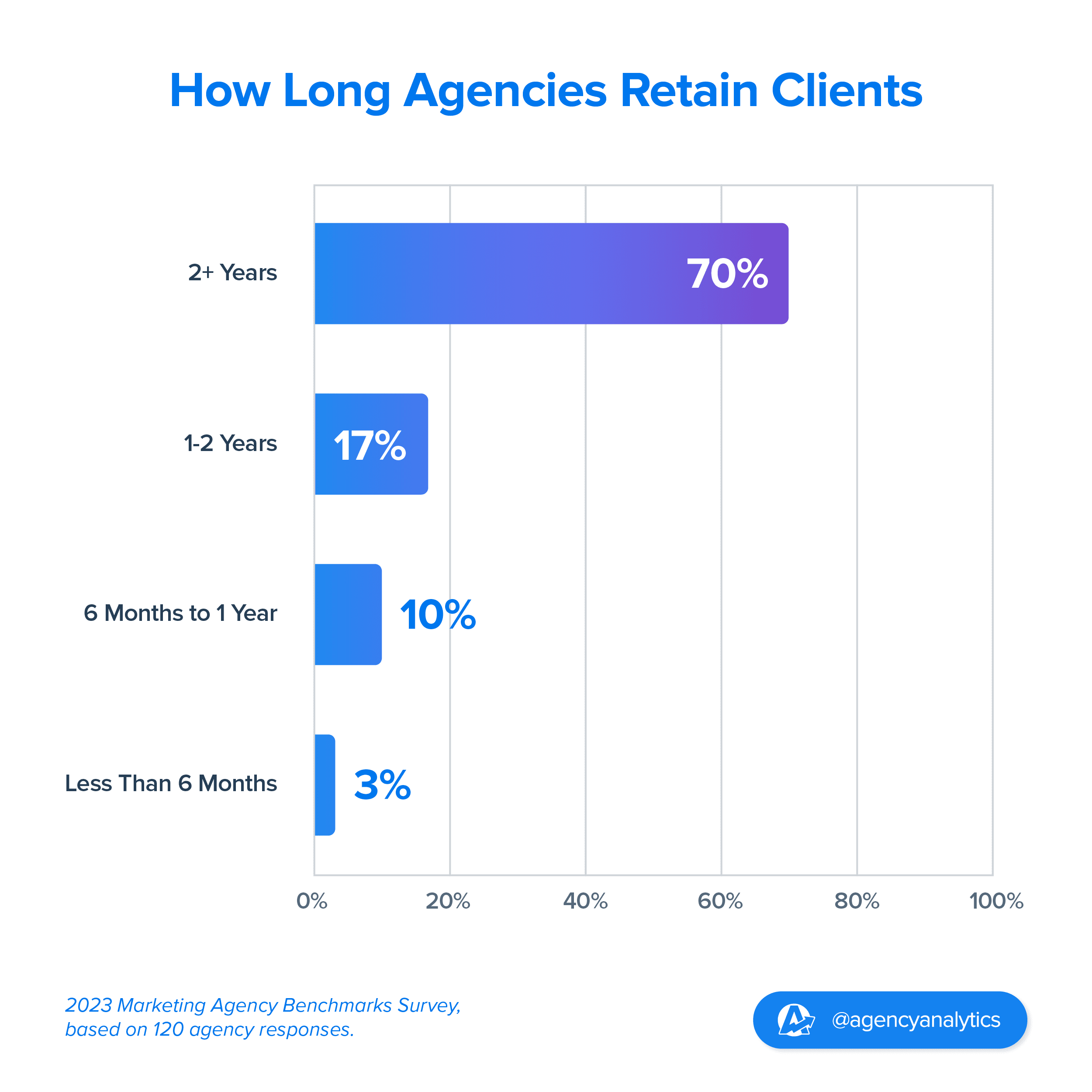
This is good news. Customer retention is vital when building a successful marketing agency with long-term growth potential. Research shows that for every 5% increase in retention rates, profits go up by 25-95%.
It goes without saying that satisfaction rates play a key role in turning new clients into loyal customers. CRM software allows marketing agencies to provide top-tier customer service to long-term clients while seamlessly onboarding new customers and upselling existing ones. These systems make it easier to personalize service, track campaign metrics, and balance a wide array of unique client goals effectively, all of which leads to more positive customer experiences.
Enabling Better Decision Making
CRM systems empower agency leaders to make data-driven decisions faster by allowing access to real-time client analytics. Not only does this help determine next steps for customer campaigns, it also lets results-driven marketing agencies make informed internal decisions about lead generation and growth goals, such as customer acquisition.
For example, let’s say you’re a sales leader at a marketing agency that’s looking to quickly scale in your industry. You’re trying to determine which strategy to focus on in the next quarter, but are overwhelmed by options. If you have a solid CRM, you’ll be able to identify trends in client engagement through past and existing accounts, allowing you to better understand where to concentrate your efforts in the market.
Access To Diverse Data Streams
An effective CRM should allow marketing agencies to store data from a variety of sources. This empowers your team to better understand complex marketing analytics, including sales metrics, client interaction history, customer feedback, website analytics, and financial insights. Not only will this optimize your workflow and reduce manual labor, it will also increase efficiency, productivity, and overall performance.
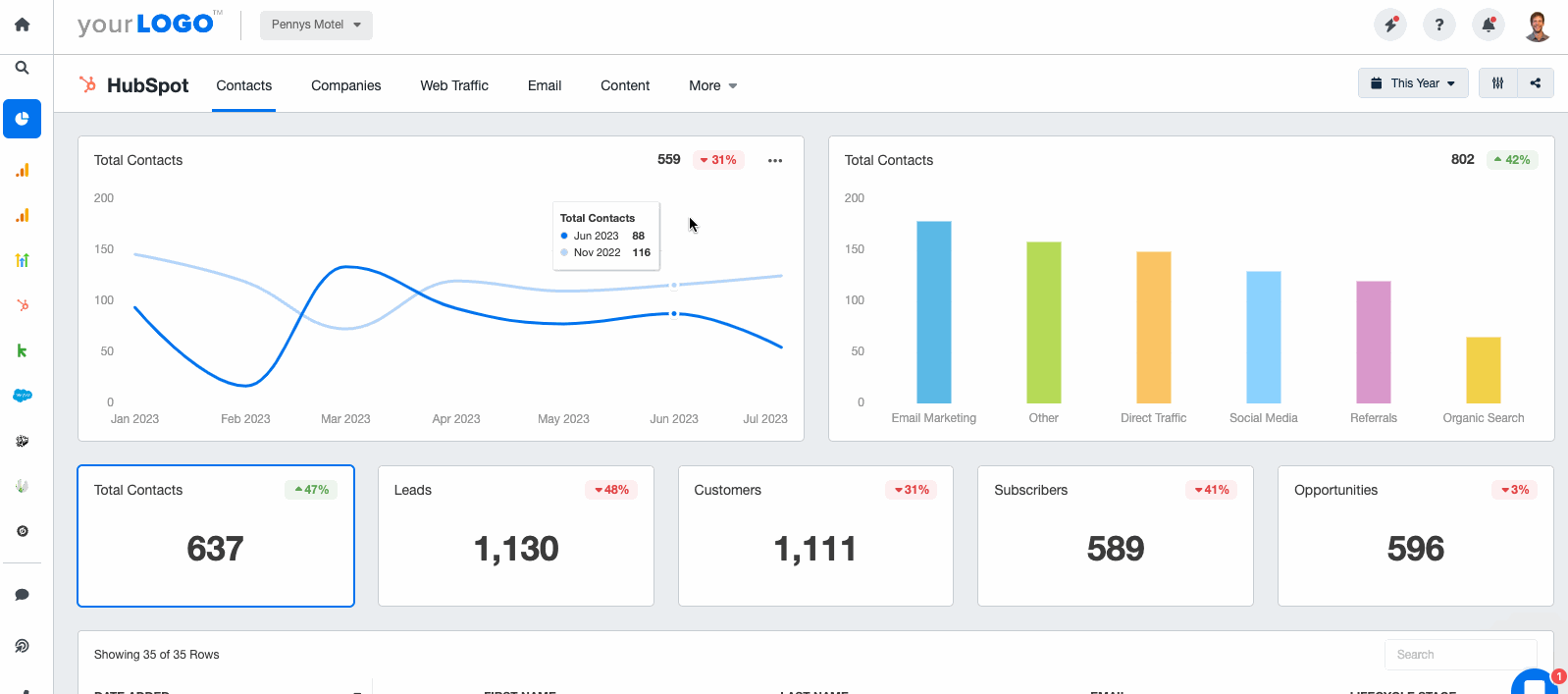
Manage agency contacts at-a-glance with a custom white labeled HubSpot dashboard. Try AgencyAnalytics free for 14 days!
Enhancing Security Measures
Data security is a significant priority for marketing agencies and clients alike. By storing all passwords, emails addresses, and login information in one secure location, you’ll decrease the threat of data security issues and further entrench client trust in your agency.
Impress clients and save hours with custom, automated reporting.
Join 7,000+ agencies that create reports in under 30 minutes per client using AgencyAnalytics. Get started for free. No credit card required.
Already have an account?
Log inChoosing the Best Features for Your Agency
Every marketing agency has unique needs, which is why it's important to choose a CRM that supports your growth goals. All CRMs should have certain features at their core, such as an easy-to-use interface, the ability to help your agency as it scales, and solid contact storage and management features.
Other features to keep in mind include:
Lead Management, Identification Capabilities, and Interaction Management
Identifying and organizing potential leads is essential to sustainable growth. Your CRM should allow you to store lead information, including contact info, and details on each interaction. Analytical tools that shortlist leads and identify promising prospects are also a worthwhile investment.
Integration Potential
A CRM system that integrates with top marketing platforms will help streamline the marketing process. For example, the ability to pull in data that demonstrates the success of lead nurturing strategies carried out on your blog or agency social media accounts will enhance decision making regarding where to focus your efforts in the next quarter.
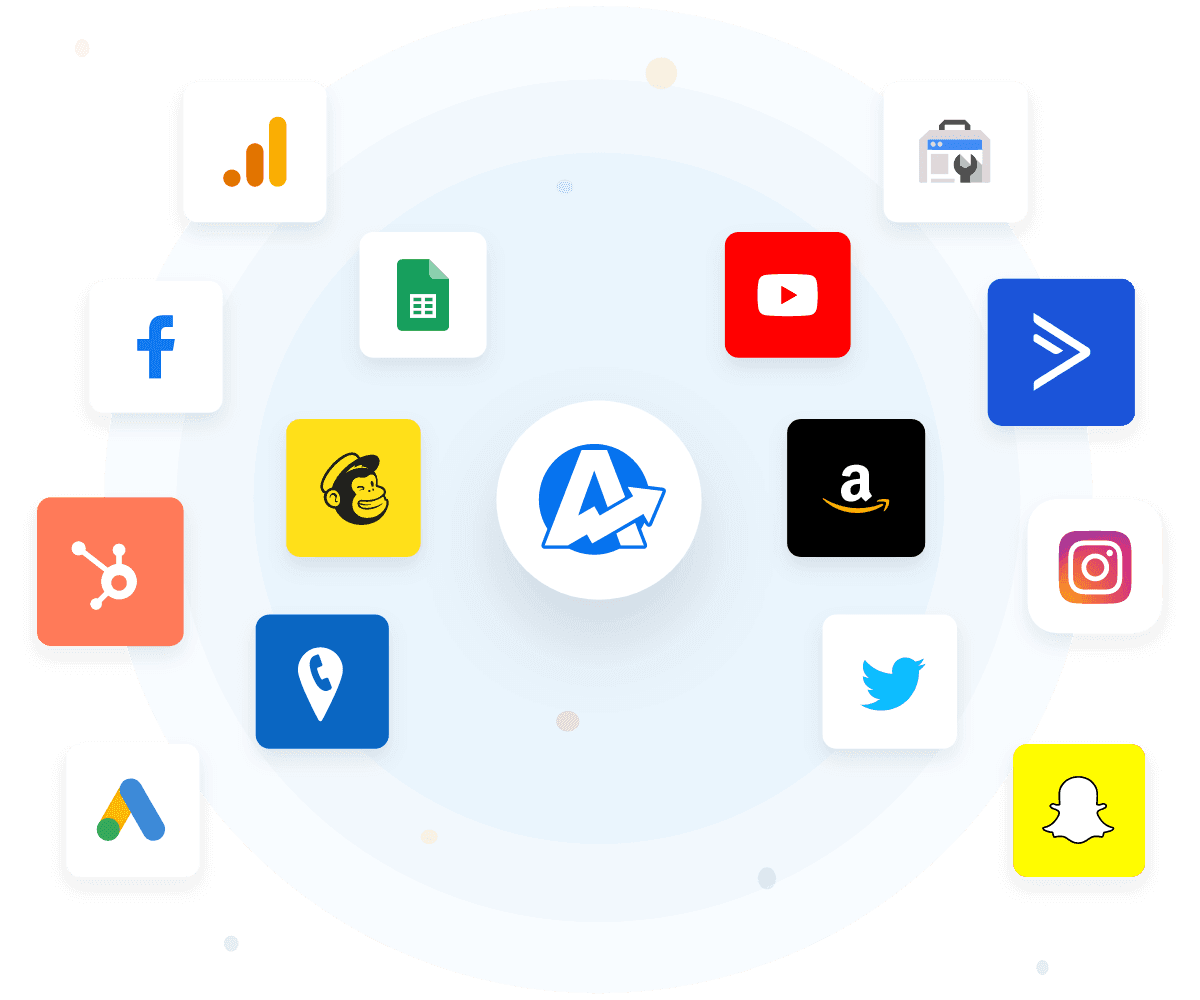
Pull data from more than 80 marketing platform integrations to paint the full picture of your lead nurturing efforts. Try AgencyAnalytics free for 14 days!
Scheduling Features
Some CRM systems let marketing agencies schedule calls, meetings, and emails while automatically sharing these times with both internal teams and clients. This optimizes your project management workflow while simplifying an essential task.
Client Profiles
Creating client profiles is a helpful way to organize each client account and increase customer loyalty. By creating a profile with project information, customizable fields, and personalized notes, your agency will be able to keep up with a variety of customers at once.
Visual Representation
Your CRM should give your agency a full view on all clients and prospects. By organizing accounts and contacts into categories throughout the client lifecycle (for example, Lead, Prospect, Opportunity, Customer, and Churned), marketing agencies view how contacts progress through the sales funnel at a glance.
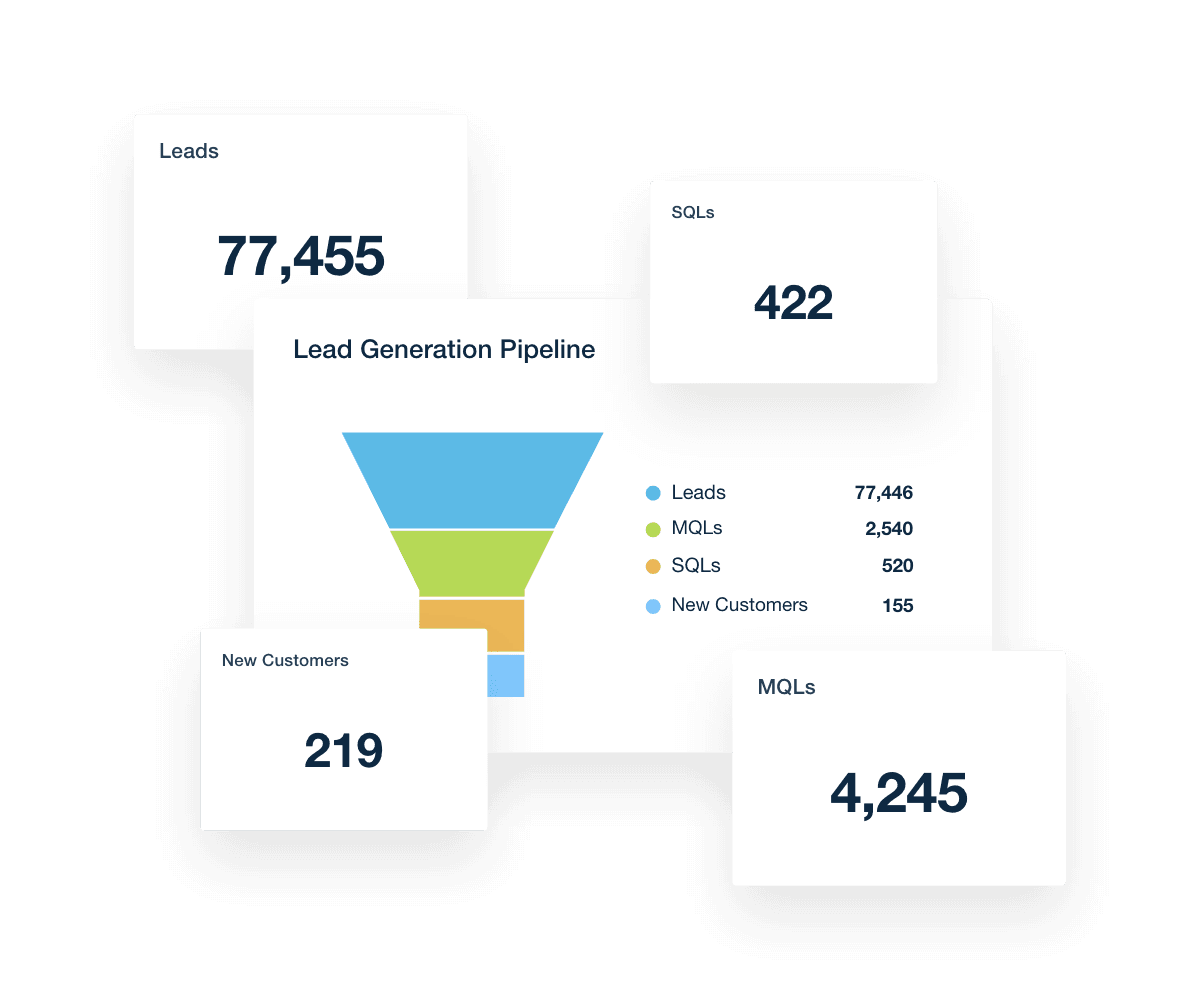
Visually represent your lead generation pipeline by creating a Salesforce report with AgencyAnalytics. Try it free for 14 days!
6 Best Practices for Marketing Agency CRM
Customer Relationship Management processes will differ from agency to agency. But there are a handful of CRM best practices that should be applied across the board to optimize your sales funnel activities.
1. Train the Team
Especially if your agency is implementing a new CRM software solution, take the time to walk team members through your expectations. How often should account managers be updating progress in the funnel? What are your naming conventions? Who should be tagged on which activities? How often should team members collaborate on next steps? Make sure that the team is comfortable working with the CRM software, and understands the role they’ll play in optimizing the client journey.
2. Set Goals
What exactly is your agency trying to achieve by optimizing your customer experience? Do you need to increase leads? Track lead nurturing activities in the pipeline? Convert more leads into paying clients? Optimize project management? Are there spots in the pipeline where you find that contacts sit stagnant rather than moving forward? Identify your goals for CRM early, and make them the foundation of the CRM strategies you roll out.
At Rothbright, we believe goal setting is required for improvement. We live by the famous business adage: you can’t control what you don’t measure. We use an objectives and key results approach to both the client acquisition and client retention process to stay on track and perform better over time.
Daniel Patton, CEO, Rothbright
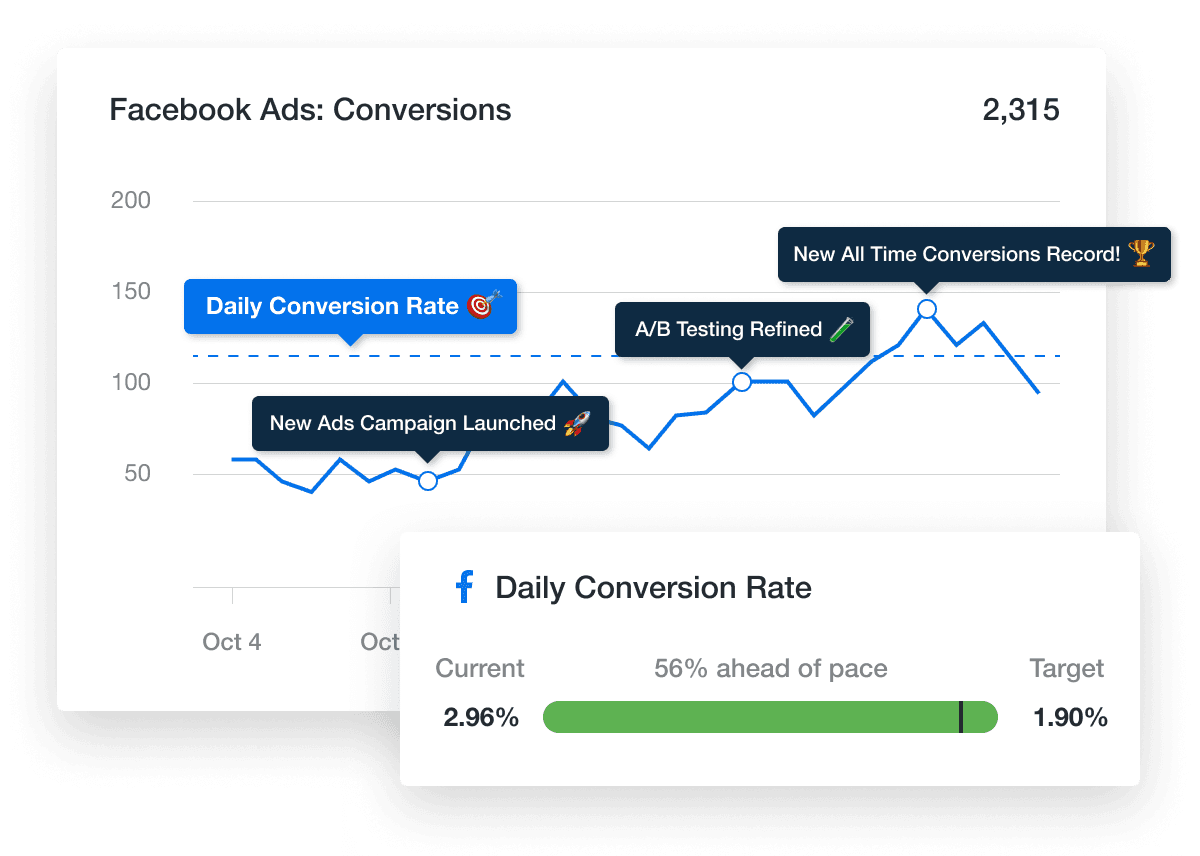
AgencyAnalytics makes it easy to track goals for your agency and clients alike. Add annotations to reports to call out progress and milestones–try it free for 14 days!
3. Collaborate
A CRM system should make it easier for agency departments to successfully work together, avoiding siloed teams whose goals don’t align. Collaboration features allow teams to share information about client deliverables and easily track the progress of important projects and campaigns, assisting in project management optimization. By tracking your agency’s interactions with potential clients, teams collaborate on key moments (for example, that critical moment when an opportunity could transition to a paying client), nudging leads through the sales funnel.
4. Automate the Workflow
Future-proofing your marketing processes is vital for consistent long-term growth. Marketing agencies should choose a CRM with marketing automation capabilities that replace time-consuming manual tasks, allowing for a more efficient, streamlined workflow.
For example, once a prospective client signs up for your newsletter, they could be sent a series of optimized emails that educate them on the value of your agency’s services. From there, your CRM would track their activities and interactions with your marketing team to plot their location along the sales pipeline. Including marketing automation elements will save the agency time and make the overall sales pipeline more effective.
When we are able to streamline manual processes and reduce the time and resources spent on tasks like data management and reporting, we can allocate more time to client acquisition, campaign management, and strategy development. This can lead to increased revenue and growth for our agency, as we are able to take on more clients and deliver better results. It can also help us build stronger relationships with our clients, as we are able to provide them with more personalized attention and support.
Daniel Dye, President, Native Rank, Inc.
5. Maintain Data Integrity
A CRM system should ensure all data is accurate, consistent, and coming from a reliable source. It’s vital to check that the platform you choose has a robust CRM data validation process in place that checks for inconsistencies when metrics are entered. A clean database keeps client information private while eliminating the risk of duplicated accounts.
6. Monitor the Analytics
Ideally, your client pipeline consists of a variety of activities spanning email marketing, social media, and SEO content, as well as good old-fashioned items like inbound phone calls and face-to-face meetings. Effective CRM software should allow for a variety of integrations with industry leading marketing tools, allowing marketing agencies to track every touchpoint that a potential client has with the agency before signing on the dotted line.
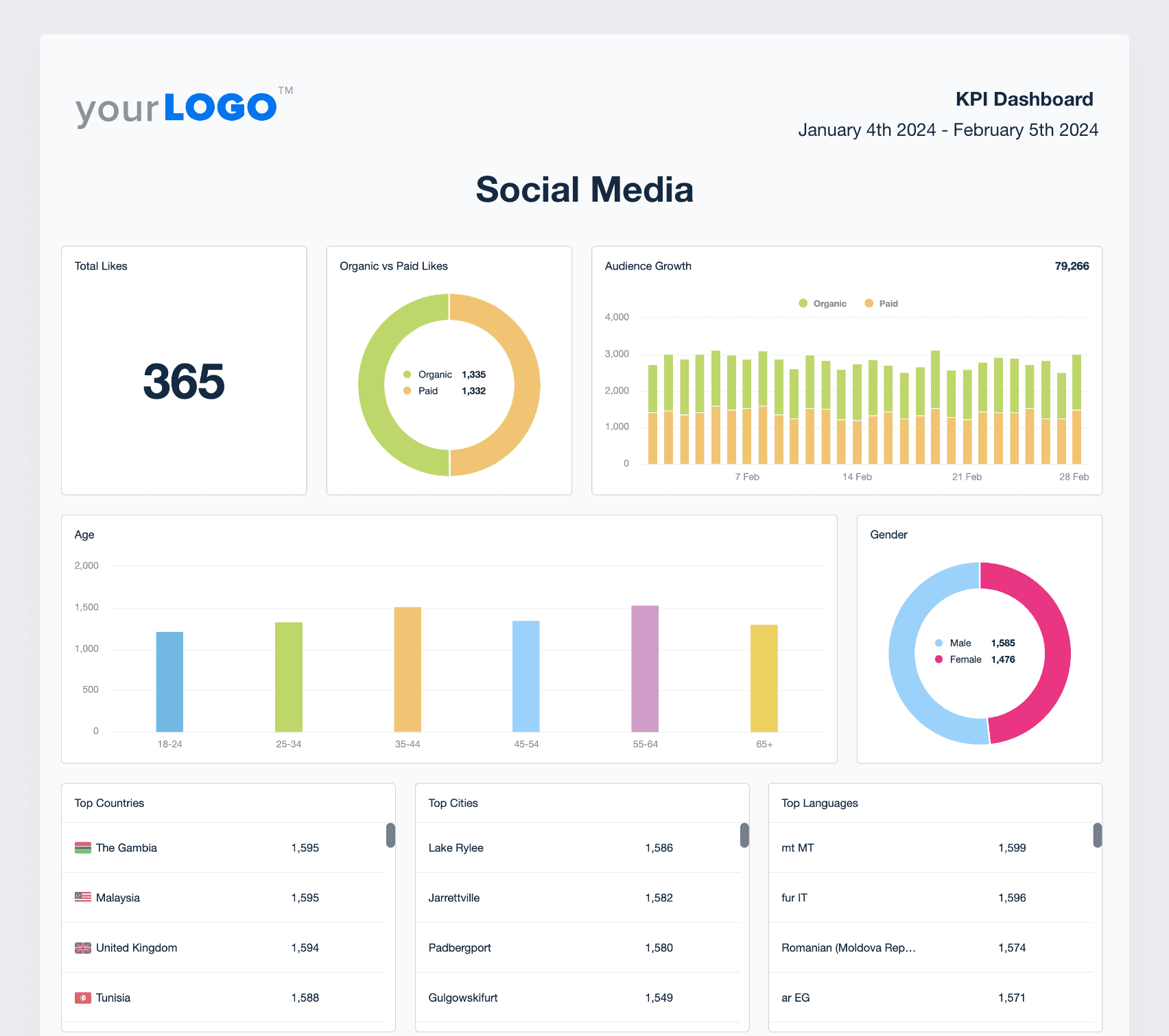
Analyze social media success for your agency and your clients. Create comprehensive white labeled social media reports in 11 seconds flat with AgencyAnalytics–try it free for 14 days!
How To Pick the Right CRM Software for Your Agency
Choosing the right Customer Relationship Management (CRM) solution is an important decision for any marketing agency. The right CRM will help streamline your sales processes, enhance client relationships, improve project management, and boost overall efficiency. Here are four key steps to guide you through the process of selecting the best CRM solution for your agency:
Identify Your Agency’s Needs
The first step in choosing a CRM solution is to clearly define your agency’s specific needs and objectives. Consider the following:
Client Relationships: Determine how the CRM will help manage and nurture your client relationships. Will you need features that facilitate communication, track interactions, and provide insights into client behavior?
Customer Data Management: Assess how you want the CRM to handle customer data. Ideally, it will allow you to easily collect, store, and analyze data to inform your outreach strategies and improve client retention.
Marketing Campaigns: What role will your CRM play in planning, executing, and tracking lead generation and lead nurturing campaigns? Take this into consideration when analyzing the CRM solution’s integrations.
By understanding your agency’s unique requirements, you’ll narrow down your options and focus on CRM software that offer the functionalities you need to manage customer interactions effectively.
Evaluate Contact Management Features
Effective contact management is essential for maintaining strong client relationships and ensuring client retention. When evaluating CRM solutions, consider these aspects:
Contact Tracking: The CRM should provide a robust contact management system that allows you to store and organize client information efficiently. Look for features like tagging, segmentation, and easy access to client history.
Customer Interactions: The ability to track and log all customer interactions, including emails, calls, meetings, and notes, is key to the success of your CRM process. This ensures that your sales team and account managers have a comprehensive view of each client’s history and can provide personalized service.
Communication: Check if the CRM integrates with other tools you use for communication, such as email platforms and social media channels. Seamless integration helps maintain a cohesive record of all client interactions.
A CRM with strong contact management features will help your agency stay organized and responsive, ultimately enhancing client relationships and retention.
Consider Usability and User Experience
The usability and user experience of a CRM solution are critical factors that impact your marketing team’s productivity and adoption rate. Keep these points in mind:
User Interface: The CRM solution should have an intuitive and user-friendly interface that allows your team to navigate and use the system with ease. A complex or cluttered interface will lead to frustration and decreased efficiency.
Customization: Look for a CRM that offers customization options to tailor the system to your agency’s specific workflows and sales processes. This includes customizable dashboards, reports, and data fields.
Training and Support: Evaluate the level of training and support provided by the CRM vendor. A solution that offers comprehensive onboarding, tutorials, and customer support will significantly ease the transition and ensure your team gets the most out of the system.
Choosing a CRM that is easy to use and customize will ensure smooth adoption and consistent usage, leading to better management of client relationships and marketing campaigns.
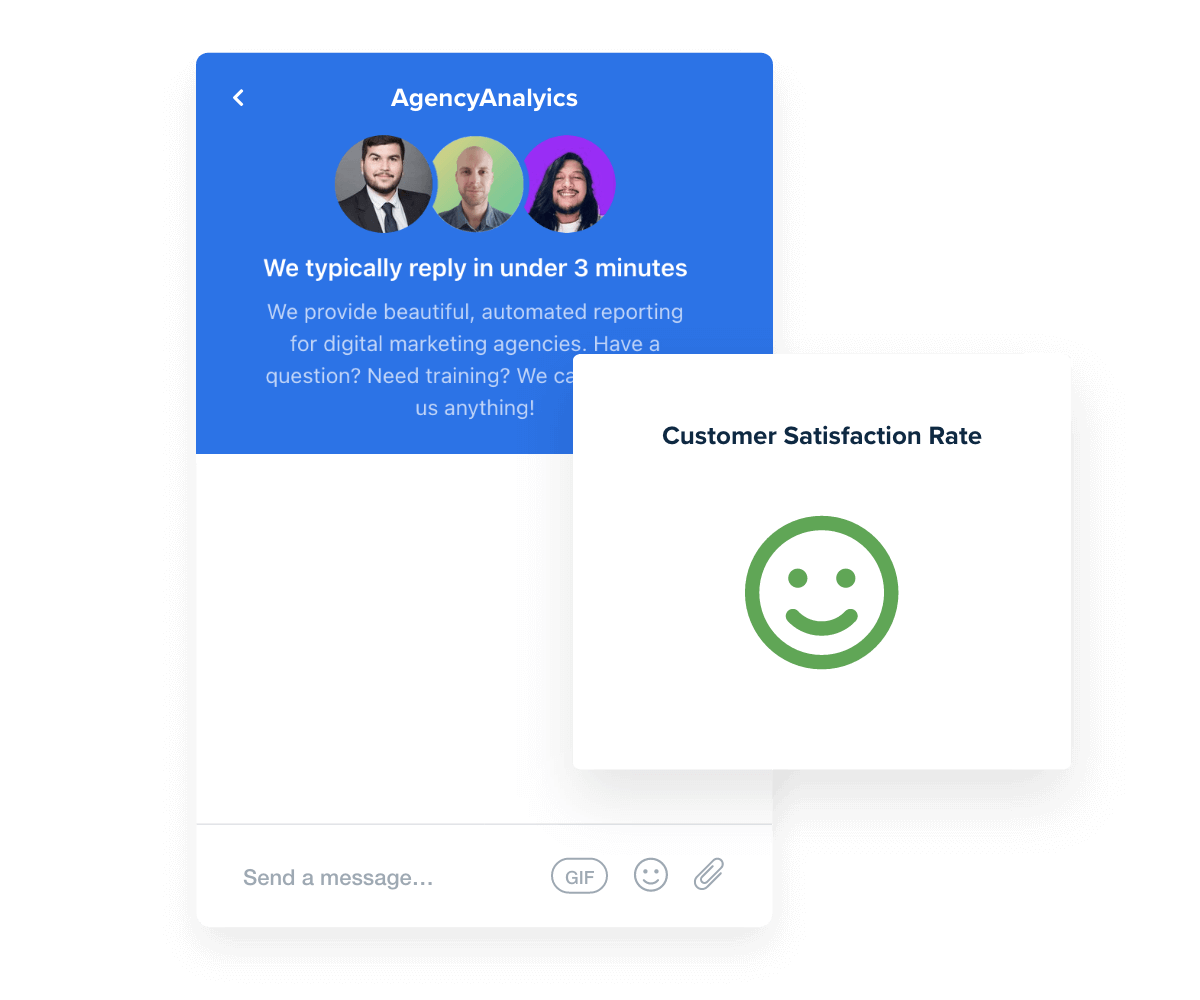
Lean on the expertise of our best-in-class customer support team, available for live chat 24/5. See what marketing agencies across the world are raving about–try AgencyAnalytics free for 14 days!
Assess Scalability and Cost
Finally, consider the scalability and cost of the CRM solution. As your agency grows, your CRM should be able to grow with you. Consider the following:
Scalability: Ensure the CRM can accommodate an increasing number of users, clients, and data without compromising performance. This is particularly important for marketing agencies with ambitious growth plans.
Pricing Model: Compare the pricing models of different CRM solutions. Some CRM systems charge per user, while others offer flat rates or tiered pricing based on features. Make sure the cost aligns with your budget and provides good value for the features offered.
Return on Investment: Evaluate the potential return on investment (ROI) of the CRM. Consider how the CRM will improve efficiency, client retention, and overall business performance. A CRM that offers a high ROI justifies the initial expense because it will deliver long-term benefits.
By assessing the scalability and cost, your agency will choose a CRM solution that not only meets your current needs but also supports your agency’s future growth and success.
Tips for a Successful CRM Implementation at Your Agency
Ensuring proper adoption of new CRM software is sometimes a challenge. Use these tips as you implement new processes to make sure that customer relationships maintain a high standard of care.
Emphasize Repeatable Processes
Your CRM should support your sales processes by allowing you to fully see your sales pipeline and manage a variety of leads at once while keeping your agency’s unique structure in mind. It helps to have a lead organization feature for each part of the sales cycle. This includes listing:
Leads you want to contact.
Leads who have already been contacted.
Qualified leads with an established relationship.
Leads in the proposal stage.
Leads you’ve won or lost.
Agency-Wide Buy-in Is Key
By properly leveraging a CRM system, you should be able to keep up with each lead and quickly understand which are worth pursuing. Still, without agency-wide buy-in and commitment from executive leadership, even the best system won’t lead to growth. It’s important that all marketing teams are on board with using the new CRM software and see the lifetime value of the implementation. After all, Excel spreadsheets can only go so far and often lead to missed opportunities.
Building Sustainable Growth
Maintaining strong client relationships through positive customer interactions is easier said than done. Managing a variety of unique clients while ensuring your internal marketing teams are able to effectively collaborate is a considerable challenge for any marketing agency.
But by leveraging best practices and utilizing the right tools, it’s possible to tame the beast of CRM and streamline the sales pipeline, leading to improved conversion rates and a reliable client pipeline for your agency.

Written by
Rita Poliakov is an experienced content writer with a knack for storytelling. As a former journalist, she's a skilled researcher, interviewer, and grammar nerd.
Read more posts by Rita PoliakovSee how 7,000+ marketing agencies help clients win
Free 14-day trial. No credit card required.






